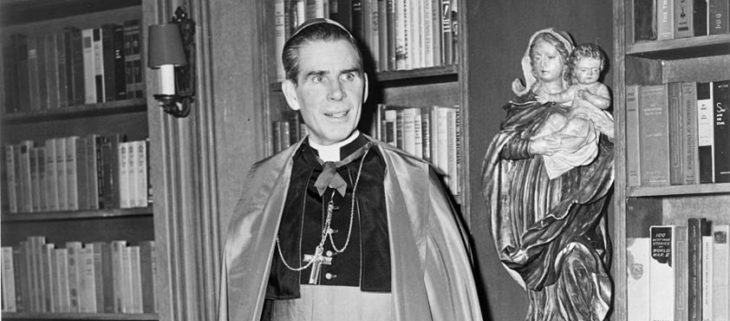Archbishop Sheen’s Idea of Education
This article by Patrick Reilly, President and Founder of The Cardinal Newman Society, was published at The National Catholic Register prior to the unexpected delay of Venerable Fulton Sheen’s beatification (originally planned for Dec. 21). Please continue to pray for his Cause for sainthood.
Education should teach us the “truth about man,” said Archbishop Fulton Sheen. A graduate of and longtime professor at The Catholic University of America in Washington, D.C., before he was a television celebrity, Sheen should inspire Catholics to seek out authentic education.
For 23 years, Sheen taught courses such as “Philosophy of Religion” and “God and Society” at Catholic University, making frequent use of Caldwell Chapel on campus. After teaching, he moved into television and radio programs, reaching greater numbers—even until today—with his wisdom, wit and unparalleled teaching ability.
One of his former students, Father William Amann, said that Sheen’s strong faith was obvious in the classroom. “He was a very holy man and it came out certainly in the presentation of his class. His holiness was evident in his demeanor and the classes he gave, his belief in God, and his trust in the Lord.”
For Sheen, education was about training the “whole man—the intellect and will, not just the mind alone.” Related to the intellect, he described the educated person as one who will do three things: “seek truth,” have a “correlation of studies” and have “depth, particularly the deepening of mystery.”
For the first, Sheen urged that the “one basic truth we have to learn is the truth of our own existence.” He lamented that people live years of their lives without learning “why they are here, and where they are going.”
“When life is meaningless, it is very dull,” Sheen continued. “When you know the truth of life, then you are most free.”
On the second point, the correlation of studies refers to the idea that “there are certain subjects that ought to be regarded as essential, so that a man will be truly educated.” The tendency in education, Sheen explained, was to use the “shelf theory” and “take any course that you please.” This leads to a “disconnected and disjointed” understanding.
The “really educated man sees a relationship between various branches of knowledge,” said Sheen, urging against “overspecification” in universities. A well-rounded curriculum “will teach a man how to… know himself, know society, know his relationship to the universe, and above all, he will understand his relationship to God.”
Finally, a truly educated person will have a “philosophy of life that is solid” and will “deepen the mystery of things” rather than centering studies around various fads that come and go.
Sheen’s thoughts on education may sound lofty in our nation today, where many colleges, even Catholic ones, have become focused solely on job training. They lack the formation that Sheen insisted upon. Many colleges promote relativism, fail to provide a meaningful foundation in the liberal arts, and leave students empty and unprepared for life.
Sheen explains how a strong Catholic education can make life worth living. If families look carefully, they can find strong Catholic schools and colleges that are worthy of a saint.
This article first appeared at The National Catholic Register.

